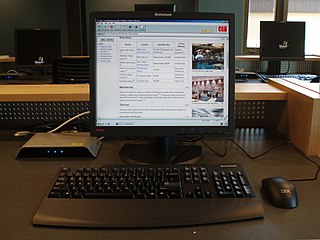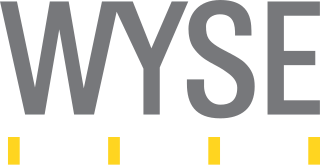
In computer networking, a thin client is a simple (low-performance) computer that has been optimized for establishing a remote connection with a server-based computing environment. They are sometimes known as network computers, or in their simplest form as zero clients. The server does most of the work, which can include launching software programs, performing calculations, and storing data. This contrasts with a rich client or a conventional personal computer; the former is also intended for working in a client–server model but has significant local processing power, while the latter aims to perform its function mostly locally.

Citrix Systems, Inc. is an American multinational cloud computing and virtualization technology company that provides server, application and desktop virtualization, networking, software as a service (SaaS), and cloud computing technologies. Citrix products were claimed to be in use by over 400,000 clients worldwide, including 99% of the Fortune 100, and 98% of the Fortune 500.
NetApp, Inc. is an American data storage and data management solutions company headquartered in San Jose, California. It has ranked in the Fortune 500 from 2012 to 2021. Founded in 1992 with an IPO in 1995, NetApp offers cloud data services for management of applications and data both online and physically.

Webex by Cisco is an American company that develops and sells web conferencing, videoconferencing and contact center as a service applications. It was founded as WebEx in 1995 and taken over by Cisco Systems in 2007. Its headquarters are in San Jose, California.

Citrix Online was the name of the online services division of Citrix Systems. Citrix Online sold web-based remote access, support, and collaboration software and services. Its products are GoToAssist, GoToMeeting, GoToMyPC, GoToTraining, GoToWebinar, Podio, and OpenVoice. Citrix Online used the software as a service (SaaS) and application service provider (ASP) software business models.

Ivanti is an IT software company headquartered in South Jordan, Utah, United States. It produces software for IT Security, IT Service Management, IT Asset Management, Unified Endpoint Management, Identity Management and supply chain management. It was formed in January 2017 with the merger of LANDESK and HEAT Software, and later acquired Cherwell Software.
Desktop virtualization is a software technology that separates the desktop environment and associated application software from the physical client device that is used to access it.
Remote Desktop Services (RDS), known as Terminal Services in Windows Server 2008 and earlier, is one of the components of Microsoft Windows that allow a user to initiate and control an interactive session on a remote computer or virtual machine over a network connection. RDS was first released in 1998 as Terminal Server in Windows NT 4.0 Terminal Server Edition, a stand-alone edition of Windows NT 4.0 Server that allowed users to log in remotely. Starting with Windows 2000, it was integrated under the name of Terminal Services as an optional component in the server editions of the Windows NT family of operating systems, receiving updates and improvements with each version of Windows. Terminal Services were then renamed to Remote Desktop Services with Windows Server 2008 R2 in 2009.
User environment management is the management of a computer user's experience within their desktop environment.
Shavlik Technologies was a privately held company founded in 1993 by Mark Shavlik, who was one of the original developers of Windows NT in the late 1980s and early 1990s at Microsoft.
InstallFree Inc. is a privately held company, backed by Ignition Partners and Trilogy Equity Partners, with headquarters in Stamford, CT and offices located worldwide. InstallFree specializes in Application Virtualization and delivery, based on their proprietary application virtualization technology that works on a variety of Microsoft Windows platforms such as Windows XP, Windows Vista, Windows 7, Windows Server 2003, Windows Server 2008, Terminal Server and Citrix XenApp.
Portable application creators allow the creation of portable applications. They usually use application virtualization.
Wanova, Inc, headquartered in San Jose, California, provides software to help IT organizations manage, support and protect data on desktop and laptop computers. Wanova's primary product, Wanova Mirage, was designed as an alternative to server-hosted desktop virtualization technologies.

Wyse Technology, often shortened to Wyse, was an independent American manufacturer of cloud computing systems. As of 2012, Wyse is a subsidiary of Dell. Wyse are best remembered for their video terminal line introduced in the 1980s, which competed with the market-leading Digital. They also had a successful line of IBM PC compatible workstations in the mid-to-late 1980s. But starting late in the decade, Wyse were outcompeted by companies such as eventual parent Dell. Current products include thin client hardware and software as well as desktop virtualization solutions. Other products include cloud software-supporting desktop computers, laptops, and mobile devices. Dell Cloud Client Computing is partnered with IT vendors such as Citrix, IBM, Microsoft, and VMware.
Code Rebel Corporation was an American technology company founded by Arben Kane and headquartered in Kahului, Hawaii, United States. The company developed and sold computer software and was best known for its terminal services and virtualization software principally for Apple Inc. products.

Whiptail was previously a privately held company that builds data storage systems out of solid-state drive components. Whiptail designed and commercialized the use of NAND flash memory as a replacement for hard disk drives in large-scale storage systems. The company is named after the whiptail racerunner, a fast lizard species indigenous to the southwestern United States.

2X Software was a Maltese software company specializing in virtual desktop, application virtualization, application delivery, Remote Desktop Services, remote access and Mobile Device Management. On 25 February 2015, 2X Software was acquired by Parallels, Inc. The 2X products, Remote Application Server and Mobile Device Management, are now included in Parallels' offering.
Citrix Virtual Apps is an application virtualization software produced by Citrix Systems that allows Windows applications to be accessed via individual devices from a shared server or cloud system.
Citrix Cloud is a cloud management platform that allows organizations to deploy cloud-hosted desktops and apps to end users. It was developed by Citrix Systems and released in 2015.
Citrix Virtual Desktops is a desktop virtualization product.







